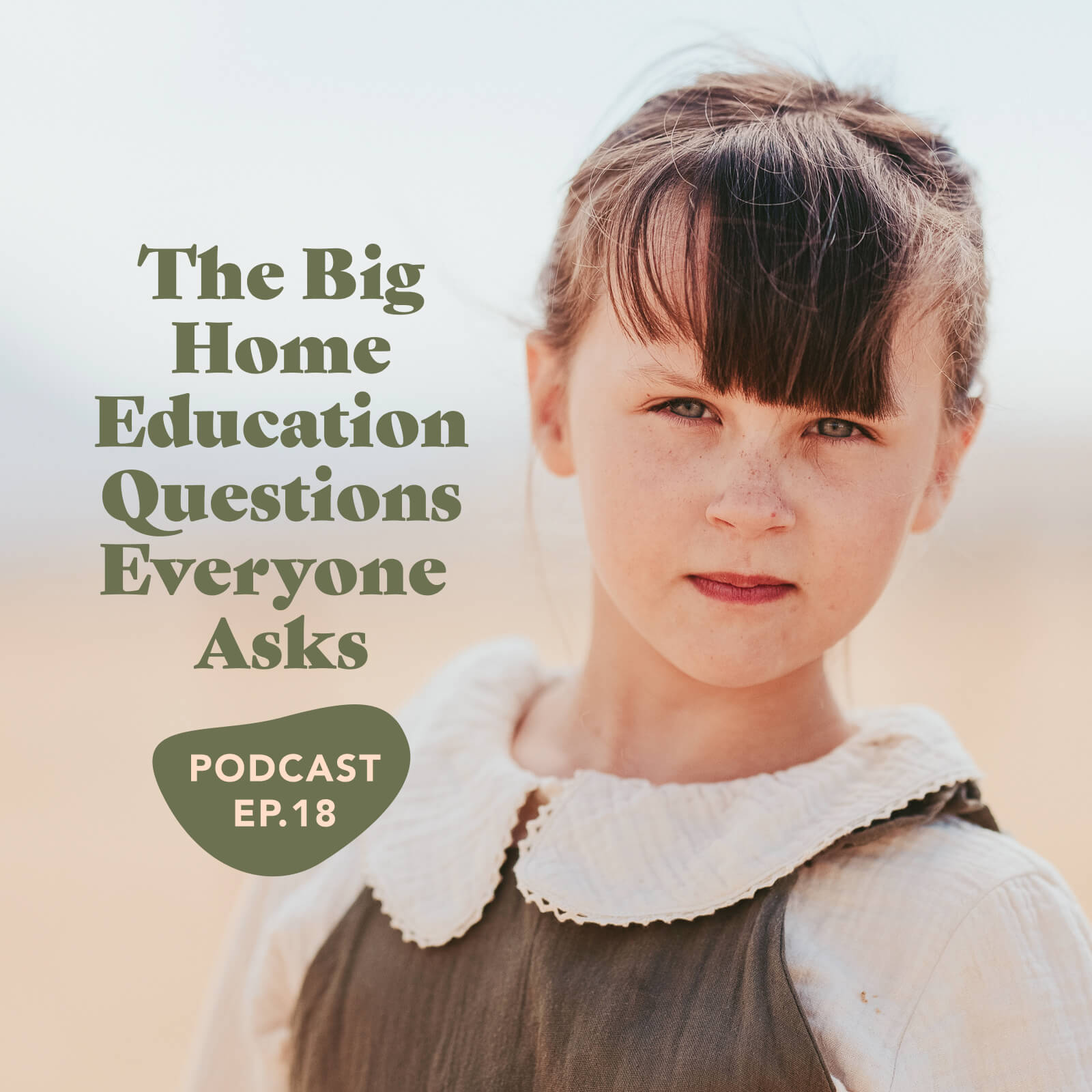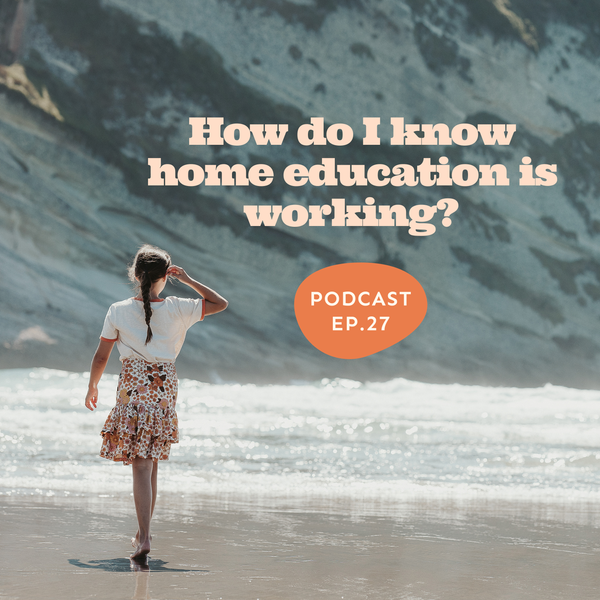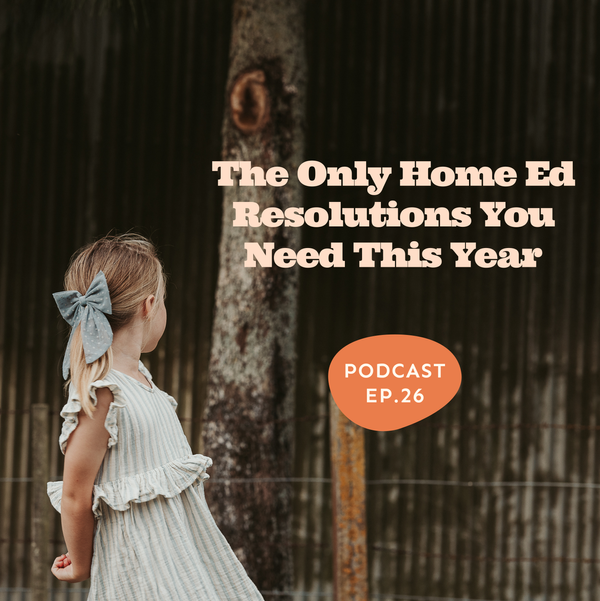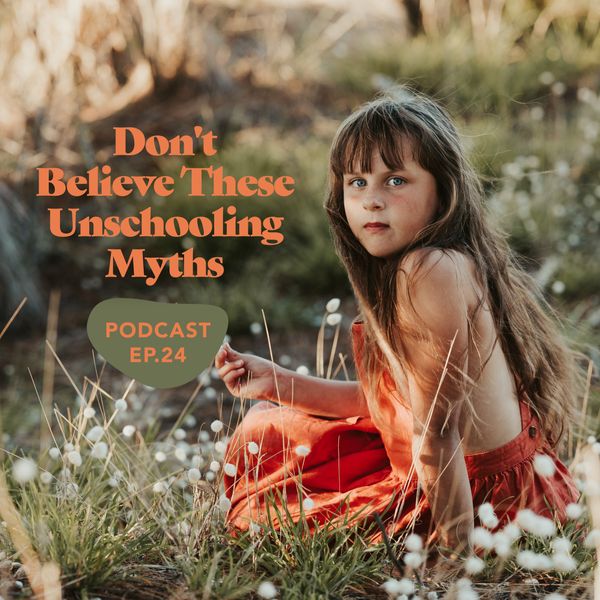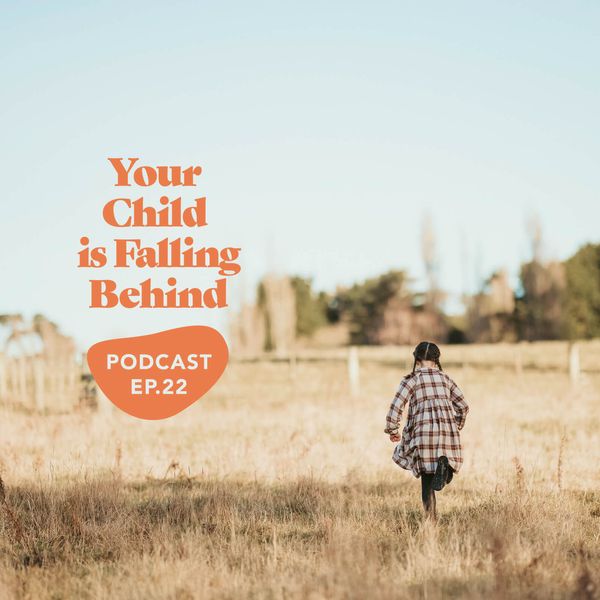Will your children be sheltered? How will you educate them properly if you’re not a qualified teacher? How will they get a good job when they grow up?
Everyone who chooses a life without school will hear these kinds of questions at some point. They’ll come from friends, family, and complete strangers. In this episode, we chat through the nine most commonly asked questions a home educating family will hear, with the goal of empowering you to confidently frame your own answers to them, in your own ways. I hope revisiting this episode from time to time will provide those little boosts in confidence you sometimes need, whenever you need them.
And if you’ve ever asked these questions, I hope this conversation has got you thinking. I hope it has grabbed enough of your interest that you want to dig a little deeper below the surface. To…question more, and be open to where that leads.
These private episodes go even deeper, backed by research, the science of how children learn and grow, and more than a decade of lived home educating experience. Each one is designed to help you rethink, reframe, and recalibrate the way you're walking this path, giving you the confidence to live the version of life you want. The Collection is 23 episodes strong and counting, with over 10 hours of listening available right now.
As a subscriber, you'll also get immediate access to my self-paced course, expert-led masterclasses recordings, five downloadable guides, our school exemption documents, and more 💛
Complete Transcript
Helloooo and welcome to the Life Without School podcast, here to help you and your children live the life you want to, not just the one you’re told you should.
I’m Issy, a writer and home educating dad from New Zealand.
You can find my work at starkravingdadblog.com – all of my posts, podcast episodes, and short films created to encourage, support and reassure anyone walking this road less traveled.
Thank you so much for tuning in to listen today. Alright, let’s get into this week’s episode.
/INTRO
Hello, hello, I hope you’re well today. Wherever you are, thank you for being here.
If you haven’t noticed, the global home educating movement is growing like never before. It’s actually been growing steadily for many years now, but the foot has well and truly been pushed to the floor recently.
Let me share a few headline statistics, from just a few countries.
The number of children being home educated in the United States has more than doubled in the past couple of years. In NSW, Australia, there’s been an increase of 30% in home educating families recently, on top of numbers that had already been growing faster than ever in the two years before that. Between 2019 and 2021, Queensland’s official home education registrations climbed 50%.
Here in New Zealand, there have traditionally been a steady 1-200 new homeschooling families register with the Ministry of Education each month. But in November last year there were more than 800. And that trend is continuing.
In the UK, even with years of growth in home educating numbers before it, last year saw another 30% increase again.
In raw numbers, globally, we’re talking about millions more families waking up to a life without school today who weren’t this time two years ago, or even this time last year.
Yes, home education has been growing steadily in many countries for many years. But clearly, some big things are happening right now.
The reasons all these families have for choosing a different path are actually quite varied. Yes, we have this backdrop of a global pandemic that has thrown all sorts of challenges at humanity, and as individuals we’re all responding to that in our own way, as best as we can. But a big part of what I think has happened over the past couple of years is that our awareness of what formal education actually looks like has grown. We’ve had all these remote learning scenarios, where the classroom environment – and the style of learning that comes with it – was suddenly at dining tables, or in living rooms, and those experiences were talked about and broadcast all over the place.
We’ve been given a closer look than ever at how children interact with the education that’s being provided to them. The pressure and expectations that come with it. The rigidity, the obsession with progress, with not falling behind.
And, I think a lot of parents saw all that, and said…oh. That’s…not quite what I thought it was. Or, maybe it is, but I’d never really thought about it deeply enough. School was always just…what you do. But I’m watching my child really struggle with this, it’s not a great experience for them, and yes – we’re seeing remote scenarios with all sorts of challenges that are specific to that – but at its core, I can see that the approach to education that’s coming through that screen is not how my child works. And it will not help them thrive.
I’m going to look at other options.
And so here we are, with millions of parents across the world dialling their focus right in on education, and how their children learn, more than they ever have before.
It’s…a good thing. And we’re going through, what I believe, will become an historically significant period of time in education. I have no idea what the next few years will look like, no idea, but I’m confident that this accelerated awareness parents now have will lead to important, positive disruption in formal education. It has been overdue for a long time, and this moment in history feels pivotal.
And because it’s growing so fast, and so many new families are joining this path, I know only too well the kinds of questions that will be asked of them. These are the kinds of questions we all face, often, regardless of how long we’ve been home educating. Some of us might find it easy to answer them on the spot, or feel they don’t have to. That’s fine. But a lot of us don’t, and wish we could.
So with that in mind, I thought it would be useful to talk through nine questions, that I’ll group into four related parts, that I’ve been asked most often in my home educating journey so far. I want to give you some punchy but conversational thoughts on those questions, gathered into one place, from which you can pull little nuggets from. I want to give you an episode that serves as a reference that you can jump back to anytime you need a bit of reinforcement, practice or encouragement in how you might frame your own responses to these very common questions.
And – because I’ve been asked many times for an episode that speaks directly to your family and friends, to thoughtfully help them start to understand some of the thinking behind the questions they will want to ask, I hope you’ll find this episode a good one to share with them.
There are a couple of angles to look at these questions from. There’s the way you’ll want to look at them – which is critically, and deeply, and continually, to ensure you understand *your* thinking behind them. That’s an important part of building your confidence in what you’re doing, and why, and I’ve gone into that sort of depth on some of these areas in previous episodes. But that depth is not always useful or practical in a conversation, so I think there’s a better way to approach it here. We’ll stay light. Conversational. But, with a piercing clarity that can’t help but get you thinking. That…will stick in your mind.
As always, we will do this from a place of care and respect. Everyone’s life is unique. Everyone has their own context, and challenges, and hopes and dreams. There will be no judgement here. Only thoughtful reflection, empowerment, and the offer of reason and clarity on the choices you have made for your family.
As we talk through these four parts, I think we’ll see why the growth in this movement is exploding. We’ll see why so many families will wake up tomorrow walking a new life path. One that, for many, they would never have imagined they’d be on.
And as we talk today, we’ll be reminded of something important: that it is clearly time for deep, and long-lasting change in the way the world understands both education and childhood.
If you’re a relative, or a friend, of a home educating family who has sent you this episode to listen to – welcome. It is so amazing that you’re open to hearing more about the choice they’ve made for their family, and why it’s so important to them. You might find this conversation challenging to some of your perspectives, but I hope you will also find it respectful, and thoughtful, and full of care. Because, I can promise you, I have written it with those feelings within me.
Ok, is everyone ready? Let’s go.
PART ONE: QUESTIONS ON BEING SHELTERED
Do you worry that educating at home will shelter your child? Do you worry they’ll miss out on valuable life experiences and learning opportunities if they don’t go to school? Do you think educating at home is depriving your child of a full, balanced life?
All of this, perhaps, is the most common perception of home education. That…there is a big old world out there, and we’re missing out on it.
If you share this concern, know that you’re far from alone. But also know that it is a myth.
You are probably picturing home educated children spending their lives at home. Don’t.
You are probably picturing them inside the four walls of a house, day in and day out, sitting at a desk in their homeschool room. Don’t.
Instead, start picturing them at the library, a skate park, a swimming pool, an art gallery, a street market, at the beach, at the park, exploring a museum.
Picture them interacting with all the different people in all those different spaces – librarians, skaters, lifeguards, gallery curators, market stall owners, surfers, park rangers, museum staff…one on one, often, about things that really interest them.
Picture them in a karate dojo, a gymnastics hall, a dance class, a music or drama school. Picture the interactions they’re having in those spaces with children passionate about the same stuff they are.
Picture the varied ages, backgrounds, cultures and worldviews of all those people they’re engaging with throughout the week, and the natural environments in which that’s happening.
We don’t need a school, or a classroom environment, to expand our children’s perspectives on life. That’s not the only place they can be introduced to other people, other ideas, other opportunities.
In fact, when you have all those classroom hours back in your day, you can choose to invest them anywhere you like. And most home educating parents are very tuned in to the kinds of opportunities – socially, educationally, developmentally – that will serve their children where they’re at, and help them grow. That will open doors to the world around them.
As for learning itself, let me take you out to our favourite walking track in the hills to share a very real scenario we have lived.
[AMBIENT SOUND (FOREST)]
“Hey there kids, no school today?”
“Nope, we don’t go to school – we’re in our classroom, right now!”
After a bit more small talk, the person passing us on the track leaned over to me and said – not with judgement, but with genuine care: “You will make sure they’re still learning, won’t you?
I think we’ve all been taken down a strange path. Somehow the four walls of a room within a school have become our gold standard learning space, the best place for a rich and varied education. Anything else is getting in the way of that.
Really think about that for a second. A small classroom, an often outnumbered, overwhelmed and overworked teacher delivering a prescribed set of topics at a prescribed pace. A group of children gathered by age as the primary criteria. A tight set of standards, measures, deadlines and accountability governing them all. A specific, narrow definition of success that is taught early and reinforced often. A place where the thought of failure chips away at our children’s mental strength almost daily, exacerbated for many by the potential of it happening openly in front of their peers. A place many, many children and teenagers slump their shoulders on the way to, and celebrate any break from.
That – that – has become accepted almost globally as the place where all the best learning happens. Has to happen. If you’re out in the world during school hours eyebrows will be raised.
Back on the walking track, among the wildlife, plant life, historical landmarks, changing weather, interactions with people we pass, physical exertion and fresh air, we reflected.
None of what we were surrounded by matched the accepted definition of the best possible learning environment. None of it looked like what learning was supposed to look like. But it very much looked like a valuable, rich, fulfilling life experience.
We zipped up our packs, tightened our laces, and carried on up the hill. This was today’s classroom, and we were ready to learn.
PART TWO: QUESTIONS ON WORK
If your child doesn’t go through the school system, how will you make sure they’re prepared for the real world? How will your child get a good job if they don’t have qualifications?
This follows on directly from that first question, because it’s part of that perception that a home educated child is somehow removed – somehow separate from – the real world. That children attending school are preparing in important ways over the years, and will soon be ready to join it.
That a home educated child is going to miss out on all that, and struggle to get a good job – maybe even any job – when they grow up.
It’s a genuine worry. It’s important. It’s good to think about it. We’re talking about our children’s ability to provide for themselves, and maybe a family, when they get older.
But we need to look at all the angles.
That typical qualification path that most children are encouraged to take is, usually, a good, solid path to employability. But please understand that it is not a great path. It is just good. It is just ok. There are plenty of graduates out there working in jobs that their piece of paper has helped them get, but who are aren’t particularly happy because they didn’t spend enough time discovering themselves before they decided on that path. And there are plenty of others who have that piece of paper, but who haven’t managed to find work in that area, and are doing something totally unrelated.
But it’s more than that. It’s that formal qualifications just aren’t even close to the employment ticket they once were.
Google’s ex-Head of People Operations, Laszlo Bock, has always been very clear about what they look for in candidates. In Google’s early years, they did the typical thing – they looked at grades, and qualifications, and the schools their candidates were coming from. But as they built up data on the performance of their teams over the years – and you can bet they had a lot of data, and used it in very smart ways – they discovered there was absolutely no benefit to focusing on Ivy League level applicants in the way they had been. What’s more, there wasn’t even a correlation between high grades and long term career performance. Their data showed that grades – the backbone measurement of our entire formal education system – are effectively meaningless.
Now, people like Laszlo – and many, many others from forward thinking and highly desirable workplaces – have been very vocal about these kinds of thoughts for many years. And we need to listen to them. They are very clear on what they’re looking at, now, instead of grades, schools and qualifications:
They want creative problem solvers. They want…leaders – which means, people who know when they should step in to help guide, and steer, and solve, but equally understand when to step back, when to make room for somebody else. They want people who are comfortable being wrong, and who lift others up.
And these companies are understanding that the school path is probably not fostering those qualities. Laszlo, of his own education, says this:
“I think academic environments are artificial environments. People who succeed there are sort of finely trained, they’re conditioned to succeed in that environment. One of my own frustrations when I was in college and grad school is that you knew the professor was looking for a specific answer. You could figure that out, but it’s much more interesting to solve problems where there isn’t an obvious answer. You want people who like figuring out stuff where there is no obvious answer.”
Workplaces all around the world are catching up to this kind of thinking now. Yes, there are plenty of employers out there who still don’t think this way. Who are stuck in the old paradigm of qualifications and grades being important. But, because they’re stuck in that thinking, they operate their businesses in the same way. There will be little space for creative thinking and input into your direction. You will be told what to do, how to do it, and when to do it. Wouldn’t it be better to know how to spot a workplace that like, and avoid it? To find one that wants you to help them grow, and that will give you the freedom to grow in return?
Now, I understand that sometimes you need a qualification. You can’t just walk into a surgical environment and get to work. You can’t just walk into a court room and start arguing with people. But, just like the best workplaces have caught on to a better way of doing things, so have the best colleges and universities. For exactly the same reasons.
They want problem solvers. They want students who can direct their own learning. They want students who ask questions, who push boundaries of thinking, rather than just following instructions. And they know that this is at odds with most children’s experiences, and conditioning, during their time at school. Trust me when I say that being home educated will not close doors to most colleges and universities. In fact, it often opens them, because at a tertiary level learning switches quite drastically towards being self-chosen, and self-led. It’s quite a change from those earlier school years. And often, a home educated child has spent more time building that self-directed learning muscle.
There are layers to this, but there is a key foundational piece to gaining entrance to most colleges or universities that sits under them – and that’s showing them, proving to them, that you’re the kind of student they want there.
Yes, it’ll probably take more work to prepare an application, because when you go to school a lot of the heavy lifting is done for you there. But I’m yet to meet a homeschooler that’s afraid of a little hard work for the right outcome.
I think we’re all learning – companies, universities, institutions, society in general – that the real world is not something you need to go somewhere to prepare for. It’s something that you live in, every day. Something you grow in. And the more time you spend exploring it, and questioning it, the more equipped you will be to thrive in it.
SPONSOR
We’re just at the midway point here in these four parts, and I want to pause very briefly to say thank you to everyone that has chosen to support this podcast through a direct donation. Your contributions are helping me work hard to support and encourage this community. Together, we’re changing the way the world sees and thinks about home education, and the education of children in general.
If you’d like to support me today, just go to starkravingdadblog.com/shop, and the donation option will be right there. You can also find it in my main profile link on Instagram and Facebook. If you choose to, I would love to hear from you in the section there that gives you space to write a short note. I want to share a couple of recent ones, because they capture, so perfectly, why I’m here doing this:
“Thank you for your podcasts and eloquent way of sharing information and your experiences. We have been on this journey for years, struggling (me in particular as a previous classroom teacher) to let go of the set schedule and any type of curriculum. Your podcast is both nourishment and inspiration for the homeschooling parent’s soul.”
And then this one…
“Thank you so much for your podcast. It is calming and reassuring. It feels like you are offering our family a supportive shoulder and friendship, even though we have never met.”
Ok, my heart is officially warm. If you’re in a position to help fuel my work here, I would appreciate it so, so much. If you do…thank you, from my family to yours.
Right, let’s get back to these questions.
PART THREE: ON TEACHING
Are parents actually qualified to teach their children? I can understand it while they’re young, but how will you make sure they’re learning advanced things like chemistry and math when they get older?
First, let’s talk about that teaching aspect generally.
Being a trained teacher involves a lot of things. It’s a skilled profession that takes study, and preparation, and ends with a hard earned qualification – but it’s important to understand that preparation is not all focused on children, and the way they learn, and how we can best encourage and foster that. That’s a solid part of it, of course, but a significant amount of energy – by necessity – goes into areas like understanding the history of education, the politics of education, classroom management, rostering, behavioural management, curriculum delivery, testing, marking, assessment…the list of things a teacher spends time on during their training is quite varied.
Now, all those things are necessary if you want to stand in front of a classroom full of children and deliver a curriculum to them on time, and with the results your school board expects. But if that’s not what you’re trying to do – and, as a home educating parent, we’re not – most of those skills just aren’t necessary.
I think if you asked most teachers what it is that slows down or prevents children’s learning the most…they’d tell you it’s all the layers and testing and bureaucracy that get in the way of them working closely and patiently with their students.
And if you asked them what the ideal learning scenario would be, I don’t think they’d tell you it had anything to do with teaching. I think they’d tell you it has everything to do with the child being ready to learn, being open to learn, and the physical and mental environment being conducive to it. Which, of course, is clearly reinforced by what we know these days about the brain. By what we know about how children learn.
And, it’s clearly reinforced by the growing numbers of teachers who are choosing to home educate their own children rather than send them into that classroom.
Researchers know, and teachers know, that knowledge and skills are not gained just because we decide to deliver them. They’re gained when a person is as ready as they can be to receive them. When, often, they’re actively seeking out that knowledge, or those skills.
So it is not actually the role of a parent to teach. It is the role of a parent to coach, mentor, guide and facilitate.
It is knowing who our children are and what makes them tick. It is knowing when to push forward on something and when to peg it back. It is knowing how they will best receive information and skills, and making sure they know when and how to find what they need when they’re ready.
It is that beautiful synergy between a child ready to discover something about the world and a parent in tune with when to open the right doors so they can.
That we can do. That we are qualified for.
Now, I absolutely get it, that sounds lovely while a child is young. We open doors, and we help them explore, and discover. But at some stage, surely, we’ll need to engage the right teachers for specialist areas like mathematics, and the sciences.
Two things:
The first is that we have access to more knowledge and learning resources than in any other period of human history. Information and teaching is no longer mainly found within the walls of a classroom. It is *everywhere*. Providing a child with seriously high quality math tuition these days is as simple as going to one of the many available platforms online and getting them signed up.
And please don’t think that’s a second-best option. Numeracy and literacy rates have been declining in many countries for quite some time. Recent studies have shown that just 12% of adults worldwide can demonstrate high proficiency in mathematical problem solving. 12%!
There are obviously a range of levels below that high proficiency, of course – intermediate, basic, below basic…but more people sit at a basic or below level in mathematical understanding than those who are at intermediate level or above. Let that sink in. Despite allll the focus we put on teaching math in schools, allll the years we spend doing it, alll the pressure we put on our children to keep up and not fall behind, more people are at a basic or below level, than above it.
If we want to direct concern about our children not learning at an advanced enough level, it should go towards the formal education system. Because, in that regard, it is clearly, categorically, not delivering on what it promises to do.
But there’s a second thing that must be discussed here. And that is that those advanced subject areas should actually not be taught to a child unless they expressly need them. Because going back to the first part of this question, about teaching in general, children are struggling to engage with and learn at those more advanced levels because they’re not ready to receive them yet. And depending on who they are, and what their goals are in life, maybe they won’t be, ever. We invest a huge amount of time, energy and resources in trying to teach them these things that are not needed unless they are needed.
It’s a bit like teaching a trainee aircraft pilot complex baking techniques. It is completely unrelated from what they’re trying to do, who they are, and what their life focus is. How well do you think they’d absorb that learning? How engaged in it would they be? How proficient would they become?
Perhaps one day they will change direction in life, and make plans to open an artisan bakery. At that point, those baking skills would snap into focus. And at that point, their brain would be like fertile ground. Ready to learn, with real life meaning and progress that will come from it.
So. Do we really need to worry about a child entering adulthood without advanced skills in mathematics and science?
Sure. But only if they actually need them. And if they do, well, as parents we know how to help them get there.
PART FOUR: ON MAKING PROGRESS
Are you worried your child might fall behind? Are you worried they won’t keep up with other children their age, and with where they need to be?
Ok, real talk: I really struggled with this question in our early home educating days. I spent hours checking the level my kids should be at across core academic subjects, either sweating on them catching up or celebrating them being ahead.
But over time a small internal voice started asking questions, growing louder until I just couldn’t ignore it any more:
You have two sons you’re trying to benchmark against one standard, but you know they’re completely different people. That they have different strengths. That one of them will tick the boxes you’re asking him to but that the other will always struggle. That only one of them was born a match for the standard you’re using. Knowing all this…how long will you try and force the boy who doesn’t fit the standard to comply with it? How long will you accept the idea that he’s behind, failing, if he’s not keeping pace with that required level?
The day I really listened to that voice was the day I started truly seeing my two boys for who they are.
The first, our eldest, an avid reader, writer and artist. There is not a square inch of his bedroom clear of his own illustrations, and he inhales books as if they give him oxygen. He writes beautifully and has a voracious appetite for creating his own work. He matches and exceeds academic standards in his sleep. In his time at school, he was a delight to his teachers.
The second, his younger brother by just two years, simply cannot spend the time needed at a desk to meet any standard that requires it.
He can read, competently, but doesn’t often – it comes in fits and starts, and usually only happens when the thing he needs to know can only be discovered in that moment by reading something.
He’s not a fan of writing – simply, I think, because he doesn’t enjoy the physical mechanics of it. He has a vivid imagination and loves telling stories, but finds actually putting pen to paper to get them down laborious and boring. You will not convince him there’s any value in writing down what he did today.
He is physically electric. He needs to move to be happy. More than ten minutes at a desk or table and he’s done. He learns by doing, tinkering, exploring, testing, breaking, fixing…making noise.
If you were to measure our two boys against normal academic standards the eldest one would crush his younger brother. He’d write you a beautifully constructed story, illustrate it, and then produce the stack of novels he’d consumed that week for inspiration.
But if you needed something taken apart and fixed, a healthy smoothie whipped up and served with freshly baked banana bread, a classical piano piece played over dinner, or a totally unique and creative perspective on a problem you can’t get your head around…you’d turn to the younger boy. He would be your guy.
So how should we measure the ‘progress’ of these two children in life? Whose inherent approach to learning, and life, is ‘right’?
Which boy is falling behind? Which boy needs to change?
What had started as a quiet internal voice has become a conviction I’ll shout as far as I can be heard: it is impossible to fall behind when your main goal in life is to be the best version of *you*.
[CLOSING MUSIC]
These questions – and the perceptions and convictions that sit behind them – often come from a genuine place of care and respect for children. Of wanting what’s best for their lives.
And that’s why I believe, so passionately, that they need to be addressed. Urgently. That the beliefs on which they are built need to be questioned, and examined, and reflected on by as many people as possible. As soon as possible.
Because when we do that – when we can find ways to set aside our own experiences, and conditioning, and think about childhood and education as objectively as we can – it doesn’t take us long to see that the way things have always been done is probably not the way we should continue to do them.
If you’ve ever been asked these questions, I hope the thoughts I’ve shared here empower you to confidently frame your own answers, in your own ways. And I hope revisiting this episode from time to time will provide the boost in confidence you need, whenever you need it.
And if you’ve asked these questions, I hope this conversation has got you thinking. I hope it has grabbed enough of your interest that you want to dig a little deeper below the surface. To…question more, and be open to where that leads.
There is a growing movement of parents, and grandparents, and families and friends, who are re-thinking childhood. Who are taking on the roles of coach, and mentor, and guide, and providing a foundation to life that is built on choice and meaning. It is profoundly different to what has gone before. And it will bring, I truly believe, profound change.
Thank you so much for listening in today. And if you find your way to my site to make a donation to the running of this show, thank you. From the bottom of my heart, thank you for helping me do this work for this wonderful community.
Hopefully I’ll see you back here next week. Take care, ok.
Bye for now.


